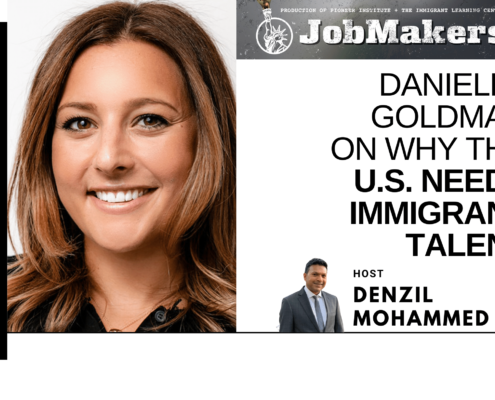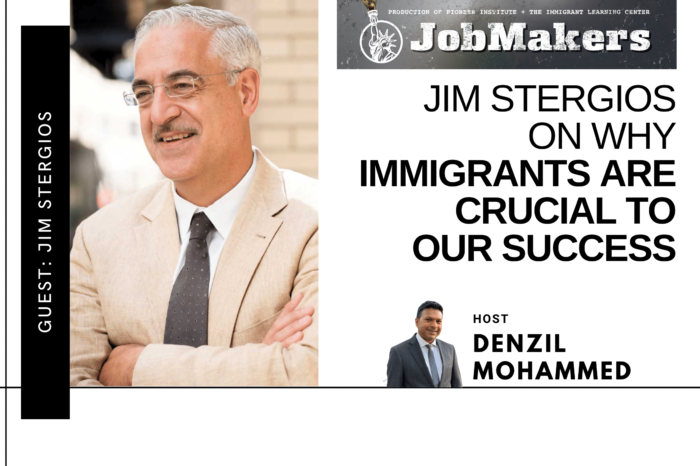Jim Stergios on Why Immigrants Are Crucial to Our Success
/in Blog: Economy, Economic Opportunity, Featured, JobMakers /by Editorial StaffThis week on JobMakers, Host Denzil Mohammed talks with Jim Stergios, executive director of Pioneer Institute, about why Pioneer collaborated with The Immigrant Learning Center to produce this podcast. They discuss the overrepresentation of immigrants in terms of job creation in America, contrary to the myth that immigrants “take” jobs. For Jim, it is a story that needs to be told because it is at the core of American enterprise, innovation and prosperity; but it is also personal. He describes his own family’s history of starting a business as young immigrants to the U.S. from Greece, and connects it to the common story of America, a nation of immigrant families old and new. And Jim believes the entrepreneurial spirit of yesteryear is the same among today’s immigrants, as you’ll learn in this week’s JobMakers.
Guest:
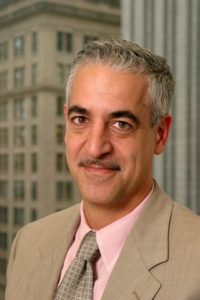 Jim Stergios is Executive Director of Pioneer Institute, a Boston-based think tank founded in 1988. Prior to joining Pioneer, Jim was Chief of Staff and Undersecretary for Policy in the Commonwealth’s Executive Office of Environmental Affairs, where he drove efforts on water policy, regulatory and permit reform, and urban revitalization. His prior experience includes founding and managing a business, teaching at the university level, and serving as headmaster at a preparatory school. Jim serves on the Board of Advisors at Boston University, where he earned a doctoral degree in Political Science. Jim has been interviewed on numerous news outlets and appears regularly on greater Boston television and radio broadcasts, including WBZ, WHDH, WCVB, NECN, Boston 25, WGBH, WBUR, Nightside with Dan Rea, and WRKO. Jim’s opinion pieces have appeared in The Wall Street Journal, The Hill, The Boston Globe, and regional newspapers throughout New England.
Jim Stergios is Executive Director of Pioneer Institute, a Boston-based think tank founded in 1988. Prior to joining Pioneer, Jim was Chief of Staff and Undersecretary for Policy in the Commonwealth’s Executive Office of Environmental Affairs, where he drove efforts on water policy, regulatory and permit reform, and urban revitalization. His prior experience includes founding and managing a business, teaching at the university level, and serving as headmaster at a preparatory school. Jim serves on the Board of Advisors at Boston University, where he earned a doctoral degree in Political Science. Jim has been interviewed on numerous news outlets and appears regularly on greater Boston television and radio broadcasts, including WBZ, WHDH, WCVB, NECN, Boston 25, WGBH, WBUR, Nightside with Dan Rea, and WRKO. Jim’s opinion pieces have appeared in The Wall Street Journal, The Hill, The Boston Globe, and regional newspapers throughout New England.
Get new episodes of JobMakers in your inbox!
Read a Transcript of This Episode:
Please excuse typos.
Denzil Mohammed:
I’m Denzil Mohammed. And this is Jobmakers
Denzil Mohammed:
At the start of this year. Pioneer Institute collaborated with the Immigrant Learning Center on this podcast due to our deep roots among immigrants in Massachusetts and beyond, particularly those who are overrepresented in one very important field. Job creation. Immigrants have always been inherently entrepreneurial from Levi’s jeans and Coors beer to Goya foods and Tesla, but that penchant for creating jobs flies in the face of the myth that immigrants take jobs for Jim Stergios, executive director of Pioneer Institute. It is a story that needs to be told it is after all at the core of American enterprise innovation and prosperity. It’s what gives the U S its edge over other countries. And it’s the truth for Jim and is also personal. His father and uncles got together and started their own business as young immigrants to the U S from Greece. There’s a common story about immigrant families, old and new, and Jim believes the entrepreneurial spirit of yesteryear is the same among today’s immigrants. As you learn in this week’s Jobmakers, Jim Stergios, thank you for joining us on Jobmakers. How are you?
Jim Stergios:
I’m doing really well. And thanks for having me, I really appreciate the opportunity and you’re doing a great job.
Denzil Mohammed:
Pioneer Institute is the one who approached the Immigrant Learning Center about doing a podcast on immigrant entrepreneurship and immigrant contributions called Jobmakers. Where did that idea come from?
Jim Stergios:
There are all sorts of divisions in how people talk about immigration and entrepreneurship and frankly they’ve lost the sense that entrepreneurship and the creation of jobs and companies are an integral part of why we seek, why we welcome immigrants into this country. If you look at the Left, I think there’s a lot of thinking that, I guess, all sides are a little bit cartoonish on this -the Left believes that America is sort of an oppressor society. If you go to the traditional Right I think they’d probably say maybe even libertarian free capital and free labor let it all flow, and then you have the more revanchist right that we saw during the Trump years really take hold, which is, oh my gosh, all of immigration is a messiness at the southern border and that’s all it is.
Jim Stergios:
And you know, I, sometimes I have to tell you, sometimes I look at the Facebook page where we post up the fantastic work that you’re doing, talking about people creating jobs and people coming here with dreams and wanting to do stuff. And I shake my head and say, do people actually think that immigrants, that the whole immigration picture is about protecting the southern border? And it’s a sort of madness. So watching that kind of a conversation that people don’t even have, they just talking past each other. I wanted to really emphasize real people doing real things, facing real problems, trying to build a real life here in America, which is why they come you know, things like, I want to start a business. I have a dream. I want to start this business and maybe I can’t get there immediately.
Jim Stergios:
Let me go do something else on there, solve that problem, or find some capital. I’m gonna find some talent. I’m going to figure out how to train them. I’m going to do whatever I can define the connections to find a way to go to market and improve people’s lives. And then, yeah, I’ll make a buck at the same time. That’s kind of what this country has been about. And I think that whole thing has been lost. And maybe if I get to say one more thing, which I think is absolutely crucial, this conversation, and that is I think Americans lose sight of the fact that the entrepreneurial spirit really does come from immigrants. Immigrants come here for a reason, for the most part. You know, of course there are people at the edges, I get all that. But they come here for a reason – they want to do something and they recognize that this society allows them to do stuff that maybe their home country would not. And that’s the beautiful mix between an immigrant wants to build something in the United States, which tends to like to see people build stuff.
Denzil Mohammed:
It’s a story I hear over and over again, no matter if you’re in big pharma, pharmaceuticals, life sciences, or you run a doggy daycare or a, you know, a corner shop somewhere, it is the same story. And I’ve heard from again from highly, very highly educated people talking about, well, you know, back home in India and Pakistan, you know, I didn’t belong to the right tribe or my skin color is not something that people would want to, you know, give me money to invest in, in, in my business idea. Dominican women who came from a very patriarchal society who would not have been able to start businesses in the Dominican Republic are able to do that hair that entrepreneurial spirit, you know, business owner, or not that entrepreneurial spirit drove them to take a risk and to come here to create a better life. Now, the fact that we present facts, we present research, we present stories. And yet even some of the simplest things like the data is questioned. You know, people question the data, the question, the numbers, the question, the motivations of people who come here, what do you think is at the heart of this kind of response, this really visceral response to immigration today?
Jim Stergios:
I think it’s dislocation in the economy. Number one, and there were certainly sort of, we’ve always had ethnic. I shouldn’t say “we,” the entire world has always faced ethnic and racial biases. We are not unique in that. We have a unique story around racial bias and around ethnic biases. We certainly do, but anyone who’s traveled. And I spent the first 10 years of my career abroad in Europe and in the far east, and look, these are things I saw everywhere. I think the second thing I’d say, and this is more now than when I was a kid. I feel like these days, there’s just so much divisiveness around what you have and protecting what you have. It’s probably because people feel more at risk. I hope it’s not more than that. I’d like to think it’s not.
Jim Stergios:
And I think that’s why we’re doing this podcast and trying to participate in this way. And just trying to inform people about real stories and real people is when you understand real people and those things start falling away.
Denzil Mohammed:
And immigration has always been to our benefit, which is a big part of the puzzle for me that has given opportunity to people who have in turn created jobs and build up economies and expanded local economies. But you have a personal connection to immigrant entrepreneurship. And tell me a little bit about your parents.
Jim Stergios:
I have the traditional immigration story where mom and dad, neither, both of whom completed high school, one with a GED came over from Syria and Greece. Neither had anything to do their name and they meet, they fall in love. My dad had been at war and world war two. The Marine in the far Eastern theater came back, had some trouble, I think in terms of trying to figure out what to do with his life after war, war is a tough thing. Moved from sales position to sales position, and finally settled on working with his brother, very family oriented business, and his other brother and founded a window and door and other construction materials, manufacturing facility. You know, it’s sort of hard work putting together money, trying to move things ahead, you at some point achieve some success and you know, it’s kind of a funny thing. I guess the difference is these days, if I think about the culture, I mean, it was a pretty religious culture at home where you did a lot of Bible study and you’d try to read things and we were pretty different from, I think, immigrants today in two ways.
Jim Stergios:
One is, we were more closed now. We would hang around with Syrians and Greeks a lot. And our interactions outside of that were at the public school where we’d get to meet other kids. Right. so I think that’s a little bit different these days. I think there’s more of a yearning to connect with other immigrants, especially given the tenor of the conversation these days. I think it’s a, probably a little bit different, especially in urban areas. And I guess the second thing is my dad used to always say, don’t go to college work, do what I do become just like me. And I think these days, immigrants probably have a very different view for the most part. If you’re starting a business, you understand what education means and because we’re in a different kind of economy a manufacturing economy, which is low investment, may be upfront building, building, building to the point where you can make bigger investments. That’s education plays a huge role now, which is, I think one of the big puzzles we have on the policy side, in Massachusetts to think through how we make sure we can address that issue
Denzil Mohammed:
What I’m getting at is this idea that somehow immigrants from the past were inherently different than immigrants of today?
Jim Stergios:
Oh no, no, no, not at all. That’s not the case. I think they’ve just grown up in a different world where, you know, Daniel Bell, the sociologist from Harvard wrote a book called The Post-industrial Society back in 1968, I think it was. And he was simply saying, look, education is going to separate people going forward. And all I’m pointing to is that, that has had an impact on how immigrants come to this country and, and what they do here. But frankly, even back in the 1960s, we had a whole recruitment effort of highly educated Indians, for example, to come here and work in the medical field. So we’ve had, nothing’s really changed that much. I’m just saying that the educational emphasis is so huge now in terms of what you can do going forward that it’s probably something that has changed some of the pattern of what I grew up with, but the values are the same, the three reasons why people come here are the same. I’m often really struck by when I talk to immigrants about what they think about the United States. And then what I hear Americans say about their own society, I would guess the polling is somewhere around like, you know, the positivity around being an Americans, like huge among immigrants and among the sour-puss Americans these days, it’s so “we’re a terrible place.”
Denzil Mohammed:
But bringing it into Massachusetts, where much of Pioneer Institute’s focus is what have you seen as the impact of immigration in Massachusetts?
Jim Stergios:
Particularly in the past few decades? Yeah, I think there’s one constant in that is immigrants coming into this country change not the underlying values. So people always feel like those are at risk. It’s rather how we interpret those values and the cultural impact of people across time are huge. And if we go back to the 19th century, anybody who’s been brought up in Boston understands the imprint on how we’ve interpreted freedom and how we’ve interpreted governing and how we’ve interpreted business creation the hospitality industry because of the Irish immigrants that were here, the role of Catholicism in our society vis-a-vis what was there before. I mean, huge, huge change. And every wave of immigrants brings that sort of larger cultural impact. And I think it’s all positive and enriching. I remember as a kid traveling to Fitchburg and to Lawrence, to Worcester connecting with people who wereon my Syrian side, Syrian Orthodox church.
Jim Stergios:
And, you know, it was just terribly enriching to those places as well. So it’s the impact of immigrants isn’t just economic – it’s literature. It impacts what we write about, the stories that we tell, the ones that we find most fetching, the ones that we find most interesting,is all impacted by that. But then of course there is this amazing impact on opportunity. And I think anybody who was in Kendall square 30 years ago and stands there again now says, oh my God, and I’m not saying those are all citadels built to the ingenuity of immigrants, but there are a lot of immigrants in those buildings. They built a lot of them. And that same thing is true across society. I mean, if you look at some of our institutions, our strongest institutions, the one that give real impetus to the development of companies here, and let’s just talk for a second about our hospital sector, ur top docs, ones that actually help us identify ways in which we can invest in the life sciences, a lot of immigrants there, and the people who were doing, even back in the seventies, you’re talking about a couple of decades going back to the seventies and eighties, the development of tech in this state, all highly influenced, highly driven by immigrants.
Jim Stergios:
SoI think anybody who talks to you, especially with MIT, Harvard, Boston University, Emerson College, Boston College, all these different universities, they’re highly dependent on, especially in the STEM areas, highly dependenton the talent that they can recruit and actively seek to recruit it. Come on, we know what immigrants have meant for the state.
Denzil Mohammed:
You talk about Kendall Square, and I think you mentioned Moderna earlier, Pfizer, the other vaccine manufacturer also founded by an immigrant, you know, maybe a century ago, but that tradition of immigrant entrepreneurship continues today and we’re all benefiting from it. But let’s not forget Field’s Corner. Let’s not forget some of these other places, you know, the Immigrant Learning Center is based in Malden Pleasant Street, Main Street, all populated by many, many immigrants, immigrant-run businesses of every kind from the Irish pub to the Vietnamese nail salon. All of these places have been revitalized through people moving in when the rents were cheap and over, may take a generation or two, but it gets there to a place of safety and prosperity.
Jim Stergios:
So that”s kind of what I was trying to get at earlier, and didn’t say as well as you just said it. I’m not down on Americans. I love this country and I love my fellow citizens. But,when you go to,everywhere from,Brookline to Malden, to Fields Corner, to Lawrence, who are starting those neighborhood businesses, yes, there are people who have been here for a century or more, but the real energy comes from folks who are immigrants and what would we do without these quintessential neighborhood businesses as well? So,that’s what I mean by replenishing the entrepreneurial spirit. It’s the desire – you’ve taken a risk to come here, the idea of taking risk, again, to put, you know, some money down and take a risk on your talent and your work ethic.
Jim Stergios:
You know, I spent some time in academia and I would salways have a laugh with one of my professors who said Jim, you eat every book you have, you are very desirous, you have big desires. And I said, I think it’s because I’m a kid of immigrants and I think it is true. Even there. She would always say, my best students are immigrants because they don’t take anything for granted. So it’s all to be achieved. Look, I’m not trying to be overly sentimental here, but I do believe there’s something to replenishing the spirit of the United States that comes through immigrants. I think that often gets lost in the messiness of our conversation.
Denzil Mohammed:
You mentioned something that I find very fascinating, which is this idea of the child of immigrants. We actually did a study through Paul Watanabi at UMass Boston on the adult children of immigrant entrepreneurs. You spoke earlier about your father wanting you to be an entrepreneur, but that this generation, you know, even the immigrants who start the laundromats or the nail salons or the grocery, really do focus on education. And what we found in that study is that the majority of the children of immigrant entrepreneurs actually go into occupations of service. So they go into the medical field, they become social workers. They become people who serve their communities by and large, which I found absolutely fascinating. And I see that, you know, in a sense you’re doing much the same thing by trying to improve policy in Massachusetts, but are we failing our immigrants? And particularly as we talk about the children of immigrants in Massachusetts you know, when polled people often find that the most detrimental impact of immigration is on our schools can you talk a little bit about how Pioneer feels about this aspect of immigration?
Jim Stergios:
Education is the thing that makes Pioneer’s heart go pitter patter – a good 50-60% of everything we do is related to K-12 education. It’s not even higher education K-12 because we think those are the formative years. And, you know, I guess the thing I’d say is that look, Massachusetts is fortunate to have had political leadership in the past that supported big reforms. And I think had some real impact on driving up the performance of low-income immigrant English language learner communities. And I feel like we have really slowed in that process to the point where just to give one example, and I’m not trying to call out Boston per se, because it’s an issue that I think applies to a number of our districts, but the Boston public schools were actually put under a consent order by the Departments of Justice and Education in 2012, because the 17,000 of the 53,000 students, about 30% of their students who were English language learners weren’t getting an adequate education.
Jim Stergios:
They weren’t having, people were trained. It was just a complete and utter mess. If you read the report, the department of justice, the department of education put out shameful Massachusetts is a high-performing state overall, and among immigrants, even lower scores – and scores are not everything, but scores are something for their students than Florida. And I guess I’d say that’s something we need to rectify and pay a lot of attention to it. For many reasons, there are reasons of equity and humanity and all the rest, but there’s also the one which goes to the heart of why people come here. That is a talent pool of people who are highly motivated because their parents are highly motivated and to lose the opportunity to have them do great stuff. That’s true of any kid,
Jim Stergios:
Of this group of folks who actually have probably inculcated into them from an early age, you must make something of yourself and do something to become a good American. That’s really shameful. And I think a real lost opportunity for revitalizing our cities across neighborhoods, but frankly, doing the great stuff in Kendall Square and elsewhere as well.
Denzil Mohammed:
What is Pioneer’s position on immigration, what areas or issues under that large immigration umbrella are most important to you and why?
Jim Stergios:
So I think our position could be stated in three philosophical things, just a little bit broad, but, you know, we respect people. We understand that all people have value and have something to contribute. And I think sometimes it’s good to just remember, we’re talking about individuals that comes from the libertarian spirit, all people matter, no one matters more than anyone else. We also believe in the rule of law. And I think the other thing we believe in is, we like debate. We like open debates, civil debate, and all three of these come crashing together on the immigration issue, because it means Pioneer will not have a clear position on some things because the rule of law bumps up against respect for all individuals, because of course, some people come from quote, unquote outside and some people are inside.
Jim Stergios:
Right? The thing that matters to us most is number one, having a real honest, but civil conversation around this based upon real lives from Pioneer’s perspective with two things in mindnumber one immigrants make up a large portion of our public schools. We have to do right by them. And number two is they play an enormous role in the economic prosperity of this state. And we want to make sure that we welcome them, that we benefit from them as much as we can and that they can benefit from being here as American citizens, if they so choose or on work visas if they don’t choose to be American citizens. And we want that to be done fairly and without bias. So those are the two things that matter most to us. And I think you’ll see, for example, Pioneer Institute is setting up a legal center. Some of the work that we’ll do will be probably related to making sure that immigrants are treated fairly here before the law,immigrant entrepreneurs will be treated fairly before the law. And you’ll see a lot of our work focus on making sure that people who may not have as much of a voice here are getting treated fairly by our school system and have ample opportunity to get educated. That’s through a new litigation center, we’re going to be setting up,early January and you’ll see Pioneer’s own work focus on those issues as well, over the coming years. So those are the two places where we land.
Denzil Mohammed:
So let’s recap, immigrants have an inherently entrepreneurial spirit. They are job creators because of that spirit. They believe strongly in the American dream. They believe strongly in freedom and opportunity. I think we’ve seen over the course of many decades that immigrants do integrate, that immigrants do learn English. Immigrant Learning Center is a free English language program. We have never had to advertise our services. We’ve always had a waitling list. That immigrants are not just numbers. They are people with stories and dreams that immigration in the U S is not just the southern border. It’s much more complex than that. And that we especially here in Massachusetts, but of course across the country have benefited from that entrepreneurial spirit that desirous spirit of getting to the American dream whether it’s Biogen and Moderna and Pfizer, or the neighborhood business that rectifies a food desert. And that this is intrinsically tied to the American story, right?
Jim Stergios:
There is no American story without it.
Denzil Mohammed:
Jim Stergios executive director of Pioneer Institute. Thank you for joining us on Jobmakers.
Jim Stergios:
Thanks for having me. Appreciate it.
Denzil Mohammed:
Thank you for making this podcast possible Jobmakers, a weekly podcast about immigrant entrepreneurship and contribution produced by Pioneer Institute. I think tack in Boston and the immigrant learning center of Malden, Massachusetts, a not-for-profit that gives immigrants a voice. Thank you for joining us for this week’s fascinating discussion. If you know someone we should talk to email Denzel that’s D E N Z I L at job makers, podcast.org. Leave us a review on your favorite streaming service. Join us next Thursday at noon for another Jobmakers.
Recent Episodes:
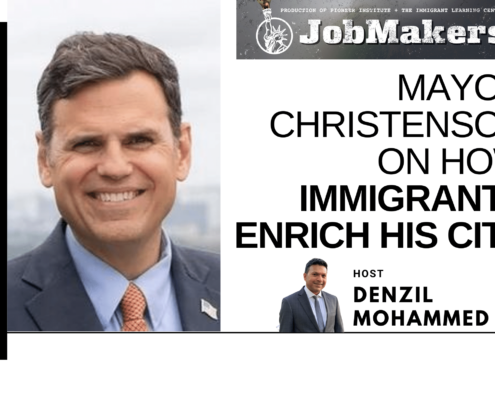
Mayor Christenson on How Immigrants Enrich His City
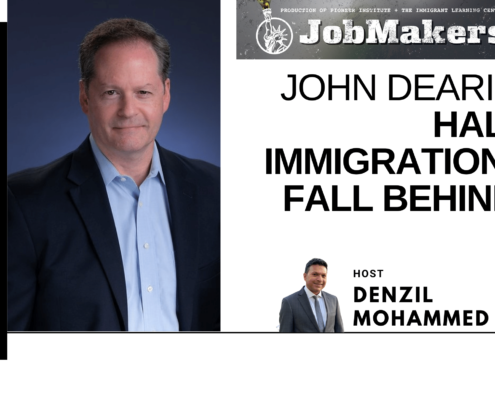
John Dearie: Halt Immigration? Fall Behind
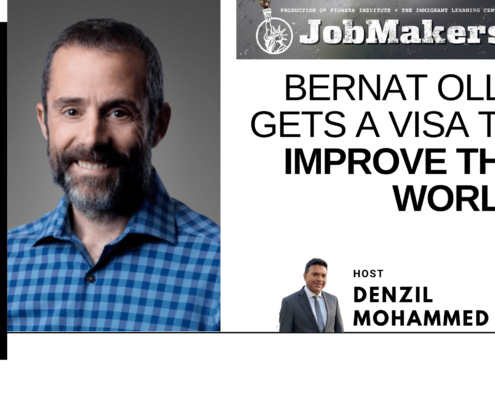
Bernat Olle Gets a Visa to Improve the World
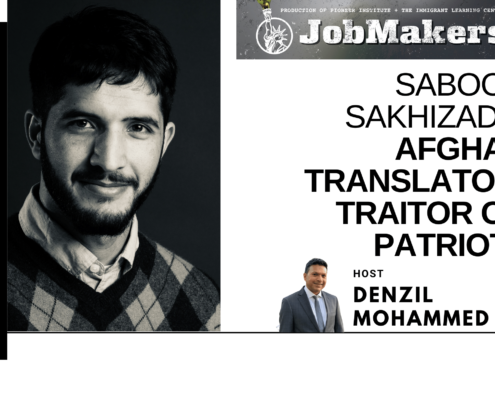
Saboor Sakhizada, Afghan Translator: Traitor or Patriot?
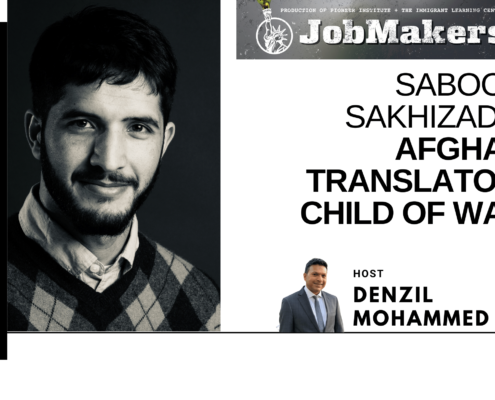
Saboor Sakhizada: Afghan Translator, Child of War
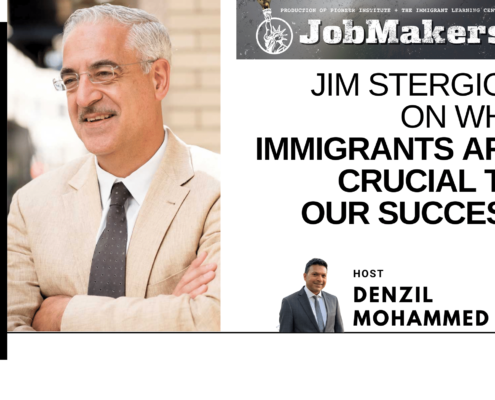
Jim Stergios on Why Immigrants Are Crucial to Our Success
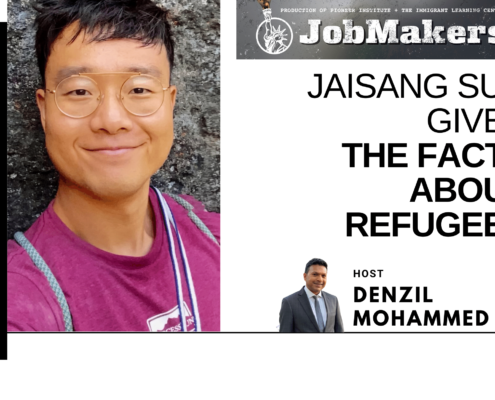
Jaisang Sun Gives the Facts About Refugees
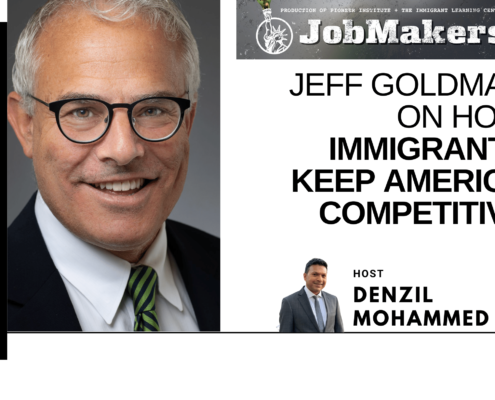
Jeff Goldman on How Immigrants Keep America Competitive

Trevor Mattos Shows How Massachusetts Runs on Immigrants
